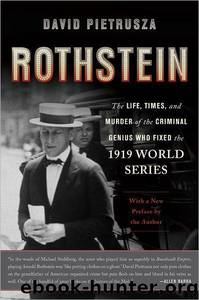Rothstein: The Life, Times, and Murder of the Criminal Genius Who Fixed the 1919 World Series by David Pietrusza

Author:David Pietrusza
Language: eng
Format: mobi, epub, azw3
Tags: Science, Sociology, Biography, History
ISBN: 9780465029389
Publisher: Basic Books
Published: 2003-09-14T00:00:00+00:00
ARNOLD ROTHSTEIN COULD EASILY HAVE walked away from gambling and loan-sharking and entered the world of legitimate business. In 1912 he was offered a $25,000-per year position as a stockbroker. He said no. Not that he ever wished to leave the demimonde of gambling. Not that he ever considered $25,000 a year enough money.
A. R. claimed that gamblers got a fairer shake in casinos than anybody did on Wall Street-and he wasn't necessarily wrong. Wall Street could be as crooked as any Bowery stuss parlor or Broadway floating crap game. Disreputable brokers-often career con menpeddled worthless stocks, manipulated prices, and swindled millions from investors. Regulatory oversight barely existed. The federal government occasionally prosecuted brokers for mail fraud, but that was about it. Investors relied on local and state officials for protection. On Wall Street, that meant Tammany district attorneys and Tammanyinfluenced governors.
As Arnold Rothstein would say, "God help them."
Wall Street scams often involved mining stock. Gold. Silver. Copper. Platinum. It didn't matter. Mining was an ideal cover for fraud. There might be a fortune underground. There might not. Who knew? With manufacturing or shipping, you either had a factory or a ship, or you didn't. Either you had merchandise or cargo or passengers, or you didn't. With mining, there might be rich veins of gold underground-or there might not. You didn't know until you put your money down.
Some of Arnold Rothstein's best friends-strike that, his closest associates, he didn't have, or want, friends-operated their own fraudulent brokerage houses. George Graham Rice. Charles Stoneham. Edward Markel Fuller. W. Frank McGee. Dandy Phil Kastel. If stock fraud was your line of work, it paid to know people like Rothstein, who could provide the necessary connections at Tammany Hall.
As the twentieth century began, an uneducated little Lower East Side hoodlum named Jacob Simon Herzig left Elmira Reformatory. Renaming himself George Graham Rice, he soon invented the racing tip sheet: but after a quarter-million-dollar miscalculation at a New Orleans track, Rice switched to peddling fraudulent mining stock. He again went to prison. In 1914, seemingly reformed, he penned his memoir, My Adventures with Your Money, warning investors:
You are a member of a race of gamblers. The instinct to speculate dominates you. You feel that you simply must take a chance. You can't win, yet you are going to speculate and continue to speculate-and to lose. Lotteries, faro, roulette, and horse race betting being illegal, you play the stock game. In the stock game the cards (quotations or market fluctuations) are shuffled and riffled and stacked behind your back, after the dealer (the manipulator) knows on what side you have placed your bet, and you haven't got a chance. When you and your brother gamblers are long of stocks in thinly margined accounts with brokers, the market is manipulated down, and when you are short of them, the prices are manipulated up.
Going straight didn't interest Rice, for in many ways he resembled A. R. "Rice was unquestionably born with an extraordinary intellect," noted one history of 1920s stock fraud.
Download
Rothstein: The Life, Times, and Murder of the Criminal Genius Who Fixed the 1919 World Series by David Pietrusza.epub
Rothstein: The Life, Times, and Murder of the Criminal Genius Who Fixed the 1919 World Series by David Pietrusza.azw3
This site does not store any files on its server. We only index and link to content provided by other sites. Please contact the content providers to delete copyright contents if any and email us, we'll remove relevant links or contents immediately.
| Crime & Criminals | LGBT |
| Special Needs | Women |
We're Going to Need More Wine by Gabrielle Union(19046)
Pimp by Iceberg Slim(14508)
Bombshells: Glamour Girls of a Lifetime by Sullivan Steve(14075)
The Radium Girls by Kate Moore(12028)
Becoming by Michelle Obama(10027)
Educated by Tara Westover(8054)
The Girl Without a Voice by Casey Watson(7889)
Wiseguy by Nicholas Pileggi(5786)
Hitman by Howie Carr(5096)
The Wind in My Hair by Masih Alinejad(5095)
The Rules Do Not Apply by Ariel Levy(4969)
Hunger by Roxane Gay(4928)
On the Front Line with the Women Who Fight Back by Stacey Dooley(4873)
Year of Yes by Shonda Rhimes(4757)
The Borden Murders by Sarah Miller(4325)
Papillon (English) by Henri Charrière(4274)
Joan of Arc by Mary Gordon(4112)
American Kingpin by Nick Bilton(3887)
Patti Smith by Just Kids(3777)
